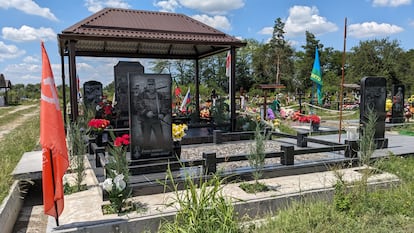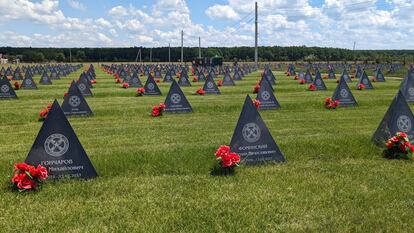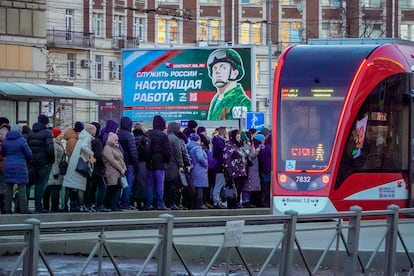The shadow of Yevgeny Prigozhin still looms over the Wagner cemetery in Krasnodar
The burial ground houses 1,000 soldiers from the mercenary group, whose leader died in a plane crash after leading a mutiny against Vladimir Putin. In the villages of the province, the absence of young people who have gone to the front is palpable


They resemble an anti-tank barrier, but under their tombstones lie nearly 1,000 extinguished lives: 1,000 marble pyramids stretched across the skyline of the cemetery in Bakinskaya, a stanitsa — Cossack village — in the southern Russian region of Krasnodar. It is one of the cemeteries in which the Wagner Group has buried its casualties from the invasion of Ukraine. Just one more in the region where wreaths to honor dead servicemen dot the outskirts of the villages and burials go on and on. Everywhere there are recruitment advertisements, and offers from funeral companies. Young and old have gone to the front and the authorities pay those who survive well.
Krasnodar was the main base of the Wagner mercenary company until the unit was forced to integrate into the Russian Armed Forces a year ago because of the hostility of its leader, Yevgeny Prigozhin, towards the high command. That confrontation culminated in a failed rebellion and the death in a plane crash, in circumstances that remain unclear, of the man who was known as “Putin’s Chef.” His ghost, however, still hovers over the Kremlin.
In the cemetery, the memory of Prigozhin is still present. His figure was evoked again by nationalist circles after the dismissal last May of Defense Minister Sergey Shoigu and a series arrests within his inner circle. Despite its integration into the military, the Kremlin has not ventured to close the Wagner company’s main Telegram channels, such as Wagner Orchestra, with more than half a million subscribers. Amid the stalemate on the front, his supporters recall Prigozhin’s victories and his temperament in the face of the silence of other commanders. “He was desperate, he was irascible and provoked terror, especially among our own. He was history and now he is a legend,” recalls a veteran on Wagner Orchestra.
Unlike Bakinskaya, the Goriachi Kliuch cemetery is closed to the public. It is a sacred place for Wagner. The mercenaries built their church there and last April, in defiance of the Kremlin, erected statues of Prigozhin and his right-hand man, commander Dmitry Utkin, who was also killed in plane crash two months after President Vladimir Putin said he had “forgiven” those who took part in the mutiny.
These are small gestures, but highly symbolic in the context of the tension that pervades in Russia. In the Wagner cemeteries the flags with the famous skull of the mercenary group have been removed and criticism of the Ministry of Defense is now subtle. The channels of Prigozhin’s company have declined to make comments to this newspaper, although previously, in tributes to its founder, some members of Wagner acknowledged to El PAÍS that the rebellion was a mistake and his death, “a thing of politics.”

Continuous trickle of dead
A section of the Bakinskaya cemetery houses the remains of Wagner foot soldiers “who died for the fatherland between 2022 and 2023,″ most of them in the leaden months of the bloody offensive on Bakhmut. But the trickle of dead continues: in one corner several slabs are set aside with the year 2024 written on them.
In another part of the cemetery, the civilian area, there are dozens more graves. There lie officers of both Wagner and the Russian army. On some tombstones is the symbol of the spetsnaz of the GRU, the special forces of the Russian military intelligence service. “Our symbol is a bat. After all, we in intelligence are still with you, little brother,” reads a message one of the tombstones, illustrated with the deceased carrying a heavy machine gun. Another states that “to be a soldier is to be immortal.”
Opposite, two gravediggers prop up the grave of another officer who lost his life in January 2023 at the age of 58. His age is not exceptional: many Russian volunteers buried there were born between the 1960s and 1980s. “But there are also young people and fathers,” says one of the gravediggers as he prepares the slabs of that grave with fresh cement. As he explains anonymously to this newspaper, fighters from all over Russia are buried in Baksinskaya.
Moscow does not publish its casualty figures. According to the British Ministry of Defense, the number of Russian dead and wounded up to April was 450,000, while the BBC and the Russian dailies Mediazona and Meduza estimate the number of dead at over 120,000. These media have been collecting data from open sources, such as inheritances, since the beginning of the conflict. According to Ukrainian President Volodymyr Zelenskiy, the Russian army had 180,000 dead by February of this year, compared to about 31,000 Ukrainians.
“We lose our lives in an instant, but the pain lasts forever,” reads the epitaph of an officer. More than 19,500 Wagner members died in the Bakhmut carnage between autumn 2022 and the first half of 2023, according to Mediazona and the BBC. Their journalists had access to a list of posthumous payments from the company and found that some 17,000 of the deceased were convicts pardoned by Putin.
The bloodletting has not stopped in 2024. A few kilometers from Baksinskaya, a funeral procession of dozens of people can be seen from the road behind the portrait of another serviceman in a nearby village.
Mass burials of soldiers have sparked protests in the Krasnodar region. The mayor of neighboring Goriachi Kliuch last year called for them to be buried elsewhere, but he was silenced by threats from some deputies in Moscow to send him to the front. According to the Bakinskaya mortician, the authorities will continue to bury servicemen at his cemetery. “Everyone says they are going to close it, but I think they will continue. There is no space left anywhere,” he says, before sighing at the hundreds of graves: “What a pity.”
The Russian Defense Ministry resumed Wagner Group operations in Krasnodar after purging its ranks. Its main base in the area is located in the town of Molkino, in close proximity to the Bakinskaya and Goriachi Kliuch cemeteries.

Enlistment offers and funerals
Beyond Wagner, Krasnodar is a fishing ground for the Russian army. Death has become an industrial process in the province. The propaganda of the enlistment centers is mixed with the discounts offered by funeral homes. The army posters promise “a job for real men,” and combine images of soldiers equipped with assault weapons and balaclavas with astronomical salaries for the average Russian: just over 200,000 roubles a month ($2,185) plus an enlistment payment of one million roubles, split between the local administration and the government.
These are unattainable figures for the average Russian worker. In addition, the small print on the posters reminds potential recruits that family members may receive other benefits if their loved ones die at the front. Among others, a payment of five million roubles: around $54,600. In July, Putin doubled the first payment volunteers receive from 195,000 to 400,000 roubles. Russian regions have entered a race to see who offers the highest salaries.
“Everyone has gone to the front, they pay well there,” says Sasun, a restaurant owner in Krasnodar who started driving a cab a year ago because he ran out of customers. “I was earning nothing for six months, many young people left. I am liquidating the business now,” says the Armenian immigrant in his fifties. “Business has totally changed,” he sighs.
In addition to being a recruiting point, Krasnodar is a key staging post for the army. There is a constant movement of troops marching to Donbas or returning home from the front. At the central bus station, a dozen servicemen wait with their loved ones before boarding the Novorossiysk-Luhansk bus. It is night-time and they hardly speak; it may be their last moment together.
Among the servicemen is a very young boy accompanied by his mother. Dressed in a t-bearing the Z — the Russian symbol of the invasion of Ukraine — he looks more like a teenager going to his first day of college than someone who is going to try to survive the next few months among drones and artillery.
Another fighter, in his fifties, waits next to his wife with a serious look on his face. They embrace before he boards the bus, and they wave goodbye to each other once he is inside. When the vehicle leaves, she bursts into tears.
The front leaves its mark. At a night stop at a gas station in Kropotkin, a soldier from another bus joins another passenger at the table with a cup of coffee. With a sunken face and a long-abandoned beard, the serviceman moves slowly, but the most striking thing is his look, the thousand-yard stare, the lifeless expression in his eyes. “Everything is complicated, says the soldier wearing the ‘Demon’ insignia on his shoulder in a brief conversation.
Sign up for our weekly newsletter to get more English-language news coverage from EL PAÍS USA Edition
Tu suscripción se está usando en otro dispositivo
¿Quieres añadir otro usuario a tu suscripción?
Si continúas leyendo en este dispositivo, no se podrá leer en el otro.
FlechaTu suscripción se está usando en otro dispositivo y solo puedes acceder a EL PAÍS desde un dispositivo a la vez.
Si quieres compartir tu cuenta, cambia tu suscripción a la modalidad Premium, así podrás añadir otro usuario. Cada uno accederá con su propia cuenta de email, lo que os permitirá personalizar vuestra experiencia en EL PAÍS.
¿Tienes una suscripción de empresa? Accede aquí para contratar más cuentas.
En el caso de no saber quién está usando tu cuenta, te recomendamos cambiar tu contraseña aquí.
Si decides continuar compartiendo tu cuenta, este mensaje se mostrará en tu dispositivo y en el de la otra persona que está usando tu cuenta de forma indefinida, afectando a tu experiencia de lectura. Puedes consultar aquí los términos y condiciones de la suscripción digital.








































